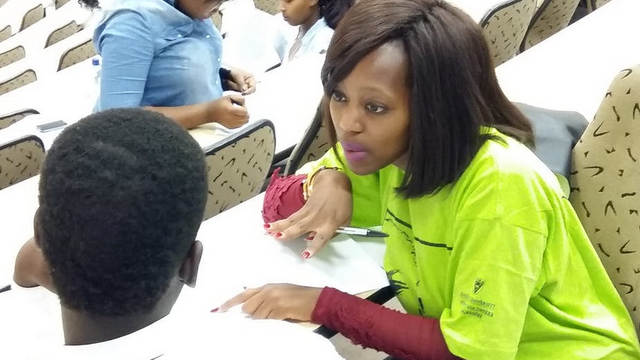
South Africa’s public schooling system is riddled with problems. Drop-out rates are high, pupils lack proper support and mentoring, and the transition from school to tertiary education is often overwhelming. But what happens when universities, NGOs and schools work closely together to address these issues? The Conversation Africa’s Natasha Joseph spoke to Professor Di Wilmot about an initiative in Makhanda (formerly Grahamstown) to improve the outputs of the small town’s public schools.
What’s the situation in public schools in Makhanda?
There is starkly unequal access to quality education. Most children attend dysfunctional no-fee paying public schools. Statistics show that fewer than one in ten black learners from no-fee paying schools leave with a good quality matric (the final year of high school) pass – the kind that would provide access to university.
Many drop out of school before reaching matric and are condemned to a life of despair in which there are few opportunities and prospects. Makhanda has a population of about 82 000 people and an unemployment rate of around 25.5%.
To try and change this trend, Rhodes University launched an initiative in 2016 consisting of a number of projects targeting different levels of education.
At the secondary level, it works with three schools whose pupils are exempted from paying fees. That’s because they come from extremely poor backgrounds – which is true for most of Makhanda’s residents.
It runs a mentoring programme called The Nine Tenths at three secondary schools: Nombulelo, Ntsika and Mary Waters. The top Grade 12 – that is, final year – pupils at the schools are allocated a highly trained Rhodes student volunteer mentor for the year. The mentoring process focuses on personal planning, studying skills, written work (especially summarising) and tertiary applications.
What’s the impact been?
In 2017, the three participating schools more than trebled their consolidated Bachelor-level passes from 16 to 52. Those with Bachelor-level passes are eligible for tertiary study. Of those students, 26 are registered as full-time students and a further seven as occasional students at Rhodes University.
In 2018, the programme worked with 170 Grade 12 pupils. Each one was linked to a highly trained Rhodes student volunteer.
The results have been remarkable.
For starters, 87% of the 2018 bachelors in no-fee schools were delivered by these three schools. All 89 bachelor passes in these three schools were gained by pupils who participated in the 9/10ths Mentoring Programme.
One of the schools, Ntsika, was rated third in the district.
We also made history: the three schools all obtained a matric pass rate of 80% or more. Nombulelo and Mary Waters have improved by 23 percentage points and 10 percentage points since 2016.
What’s being done to help students make the transition to university?
Rhodes works with a school that offers pupils who passed matric but want to improve their results a chance to do so. Called Gadra Secondary School, it produces over 100 Bachelor passes annually and is Rhodes University’s largest feeder school.
In February 2017, Rhodes registered over 100 disadvantaged local first year students for the first time in the university’s history. In 2019, the figure stood at 130.
Gadra and Rhodes also work together on a bridging year programme to improve local access to the university. In 2018, 16 people enrolled for two courses at Gadra and one at Rhodes; they studied Psychology through the Faculty of Humanities.
We recorded a 100% pass rate, and have now institutionalised the programme, expanding into the Faculty of Science and Commerce for 2019.
Are there lessons here for other universities, in South Africa and elsewhere?
Absolutely. The first is that universities should serve the public good. These institutions have both a responsibility and a degree of potential influence on public schooling that set them apart and impose a special duty of leadership. In our case, the university’s future is intimately bound up with the future and sustainability of the city.
The more accessible we are to the city’s young people, the stronger its influence will be and the stronger the bonds of association with the entire local community, eroding a culture of exclusion and despair.
Another lesson is that a big, bold vision of quality schooling for all young people can be achieved by working with partners that have different strengths and interests which can be combined and are aligned to achieve greater impact.
We’ve also learned that schools are complex social organisations. Effective change can only happen in schools where there is good leadership and a staff ready and willing to embrace it. Also, change doesn’t happen overnight. But supporting the emergence of centres of excellence – in this case, the three high schools – school by school, will be the quickest and most sustainable route to long term systemic change.
Finally, university students must be viewed as a critical resource in addressing the challenge of quality education for all in local communities.
The author wishes to acknowledge the input of Mrs Di Hornby, Director: Community Engagement, Dr Ashley Westaway, GADRA Education Manager, as well as the “Supporting Public School Education in Grahamstown” brochure produced by Communication and Advancement, Rhodes University.
